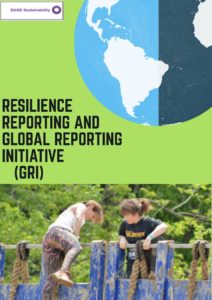– Dr. Shashi Kad
GRI should include a section on ‘Resilience Reporting’
‘Resilience’ is an intriguing word and it has different though related meanings when it comes to resilience of individuals, which is more psychological compared with systems.
So, the purpose of the ‘resilience building measures’ is to improve stability of the system. It can be stretched to say the purpose of the building resilience is to become better off than before. Ultimate goal of this thinking will be to be having no shocks or surprises as basic functions of the society work in the face of any adversity and the rest have enough buffer to manage. Again, not going into the details of mechanisms of doing that, whether it can be actor driven or system driven. The COVID 19 is one of the first such collective experience that the world will never be able to forget, however we ought to be doing better than that.
As a practitioner in organizational reporting, the first thought that comes to my mind is how GRI Reporting Standard can include Resilience Reporting in one of its section.
GRI Reporting Standards are perhaps one of the most well understood widely followed and most comprehensive framework. It gives all large, medium and small organizations an absolutely all-encompassing 360-degree view of assuring no stakeholder is left out of the equation, if the framework is adhered to.
For those who are unfamiliar with GRI Reporting, it is a global framework of voluntary reporting for organizations to disclose about their stakeholders, material issues, economic, social and environmental information.
In the economic section, direct economic value generated is expected to be disclosed. The second point is disclosing financial implications and other risks and opportunities due to climate change. While this is absolutely necessary, the scope of this section could be widened to include:
- Risk and opportunities due to any external factor that could be disruptive to a place, region or the entire world including those arising from climate change
- Resilience Reporting- How the organization is prepared to handle those disruptions. We are working on a framework that shall help in Resilience reporting in the wake of climate change/any other factor.
It is interesting that the climate change risks cover almost all ground except perhaps an extra-terrestrial impact or an asteroid impact or impact of acts of war against another nation state. There may be some more to that list which can be prepared.
Some of the important implications of climate change that are expected are extreme weather, drought, flooding, sea level rise, crop failure, temperature rise, water scarcity and yes, also increased pandemics.
Climate change can be treated as an obstacle course for resilience planning. If we are prepared to go through the worst possible outcomes in a smooth manner, we will be able to thrive on the planet………..this time sustainably.
To know more about global reporting initiative (GRI) and for standards click here.
Disclaimer: The views and opinions expressed in this article are those of the author

